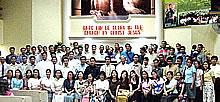 Midnight Call magazines available in PDF for online reading
Midnight Call magazines available in PDF for online reading
Dutch evangelist Dr. Wim Malgo [1922-1992] founded Midnight Call in 1955 with a four-fold purpose in mind: (1) To call people to Christ; (2) To proclaim the Second Coming of Christ; (3) To prepare the Church for His coming; and (4) To uphold the faith and warn of false doctrines.
“Midnight Call” Statement of Faith
We believe in the divine inspiration of the whole Bible and therewith the infallibility of the Holy Scripture, which is God’s Word, and in the eternal Triune God: Father, Son and Holy Spirit.
We believe Jesus Christ, the Son of God, was conceived of the Holy Spirit, born of the virgin Mary, lived a sinless life, and shed His blood to save mankind. He died and arose bodily the third day and later ascended into heaven.
We believe that the Lord Jesus Christ died in the place of each individual sinner and that all who believe in Him as their personal Savior are justified through His shed blood and have become children of God.
We believe that Israel is God’s chosen people, and that the restoration of the Jews to their own land is the fulfillment of the Word of God.
We believe in the pre–tribulational appearance of Jesus Christ for the Rapture of His Church (all born again believers).
We believe in the immortality of our souls and the resurrection of our bodies, and in the resurrection of the just and the unjust, the everlasting blessedness of the saved and the everlasting punishment of the lost.
Note: “Baptist Churches in the Philippines” blog does not necessarily endorse all the views expressed in “Midnight Call.” Be like the Bereans! (Acts 17:11)
Saturday, April 25, 2009
Midnight Call Magazine (The International Voice of Prophecy) available for PDF download
Friday, April 17, 2009
Pilgrim BBC (Kasibulan) directory of churches and ministries
![]() The website of Pilgrim Bible Baptist Church – Kasibulan, Cainta, Rizal (led by Ptr. Bong Alcala) is compiling a directory of churches and ministries. If you are interested, please register at pilgrimbbc.com and in the User Menu, you may submit the link to your church or ministry website. For more information, please contact Raffy Linsangan at tech77@gmail.com.
The website of Pilgrim Bible Baptist Church – Kasibulan, Cainta, Rizal (led by Ptr. Bong Alcala) is compiling a directory of churches and ministries. If you are interested, please register at pilgrimbbc.com and in the User Menu, you may submit the link to your church or ministry website. For more information, please contact Raffy Linsangan at tech77@gmail.com.
Saturday, April 04, 2009
How the Internet is impacting Filipino society; fulfilling the Great Commission through the Internet; chat rooms and marital infidelity
In a recent study, Yahoo! and consumer information group Nielsen revealed that:
1. There are now 20 million Filipino users of the Internet.
2. The majority of Filipino Internet users range in ages from 10 to 29.
3. Twenty eight percent of Filipinos in National Urban Philippines have accessed the Internet in the past month. Five percent access the Internet every day.
4. Internet usage is particularly higher among the younger segment. Fifty percent of those below 20 years old have accessed the Internet in the past month, with the following breakdown: 10-19 years old (50%); 20-29 years old (41%); 30-39 years old (19%); 40-49 years old (12%); and 50+ years (3%).
5. Internet use is not restricted to the big cities like Metro Manila. Other cities are experiencing Internet growth. For example, 35% of Filipinos in Cagayan de Oro have accessed the Internet in the past month.
6. Filipino Internet users are more likely to be opinion leaders and early adopters compared to traditional media consumers. They are likely to be individualistic, trend conscious, willing to pay for quality products and tech-enthusiasts. They also look for advice online before buying new things.
7. Internet cafes are an important access point. Seventy one percent have accessed the Internet from Internet cafes in the past three months. Forty seven percent of all Internet time are spent in Internet cafes.
8. More Filipinos, especially the younger population, are favoring the Internet more than television and print. TV viewership declined from 98 percent in 2007 to 92 percent in 2008, out of 1,200 people sampled. Readership of newspapers also showed a decline from 19 to 15 percent between 2007 and 2008. Magazine readership also went down from 16 percent in 2007 to just seven percent in 2008.
9. The most common online activities for Filipino Internet users are e-mail (63%), Instant Messaging (63%) and Search (58%), followed by searches (58%), playing games online (53%), social network site (51%), download/upload of digital photos (42%), Internet radio (28%), down-/upload music files (25%), read news online (24%), Internet SMS (23%), online banking (3%), purchased products online (3%).
10. One in three Filipino Internet users have a blog.
11. Social networking is a key online activity with 51% of the survey respondents claiming to have visited a social networking site in the past month.
Helping fulfill the Great Commission through the Internet
Please read my posts “An Open Letter from Internet Evangelism Day about Web Ministry Training” and “Reaching the world for Christ through Internet evangelism and cybermissions.”
Some of the web evangelism seminars from the Web Ministry conference are now available to watch online by video and Powerpoint. (These videos are best viewed using Internet Explorer. Some users have experienced problems loading the videos when using Firefox.) The seminar topics are:
- Evangelism and Mentoring: Building Relationships That Change Lives, by Karen Schenk, Truth Media
- The Power of Personal Testimony, by John Sorensen, Evangelism Explosion
- Reaching Your Community Through A Church Website, by Brent Purves and Cam Hall
- The Edges Of Cyberspace, by John Edmiston, Antioch Internet Bible International
- Rethinking Internet Evangelism And Online Ministry, by Robby Richardson, Gospel Communications, International
- Evangelism In SecondLife, by Debra Brown, Brown Governance
If you want to learn more about how the Internet is impacting society from the point of view of a secular psychologist, please read “The Psychology of Cyberspace” by John Suler, Ph.D. Department of Psychology, Science and Technology Center, Rider University. Among Suler’s interesting articles are:
- The Online Disinhibition Effect: While online some people open up to reveal all sorts of personal feelings and thoughts. Others act out inappropriately in ways they never would in-person. This article explains six factors that contribute to this "disinhibition" effect: dissociative anonymity, invisibility, asynchronicity, solipsistic introjection, dissociative imagination, and minimizing authority, as well as how online disinhibition and suspicion are related to the altering of self-boundary. This revision includes a section about whether the "true self" appears online as a result of disinhibition.
- The Basic Psychological Features of Cyberspace: These features can make online encounters very different than those in the "real" world: reduced sensations, texting, identity flexibility, altered perceptions, equalized status, transcended space, temporal flexibility, social multiplicity, recordability, media disruption . This revision mentions current communication technologies and emphasizes these psychological features as elements of a conceptual model for a psychology of cyberspace.
- The Final Showdown Between In-Person and Cyberspace Relationships: We develop relationships by hearing, seeing, feeling, intuiting, even smelling and tasting (!) each other. Cyberspace and in-person encounters can be quite different on these dimensions of relating. Those differences have a dramatic effect on friendships and romances. This revision includes minor modifications throughout the article, as well as a new section on defending text and the body.
- Do Boys Just Wanna Have Fun?: Gender-Switching in Cyberspace: Why do people switch their gender in cyberspace? Is it possible to detect someone who is faking his gender?
- Mom, Dad, Computer: Transference Reactions to Computers: People may not even realize it, but they may be reacting to their computer as if it is their mother, father, or sibling. This article explores the various twists and turns in people's transference reactions to computers and cyberspace.
- The Black Hole of Cyberspace: The internet is supposed to respond to us. But sometimes it doesn't. When we receive no reply (especially to an e-mail message), that black hole can draw out of us all sorts of anxieties and insecurities.
Probably the most read and most commented post in my Legal Updates blog is “Adultery, concubinage, psychological violence and marital infidelity.” Considering that marriage and the family are Biblical institutions, it is very tragic that extra-marital affairs are rampant. Please read my Salt and Light blog posts which discuss the statistics, causes and consequences of extra-marital affairs:
- The grass is not greener on the other side
- Surviving marital infidelity
- "Sad Movies Always Make Me Cry"
- Marital infidelity: causes, consequences and conclusions
- Priceless counsel from a bargain sale book: “How to save your marriage alone”
While the Internet does provide a lot of benefits for students, professionals, government, business and the local church, there are dangers that can entangle any person. Several people have e-mailed me about their marriages having been rocked or completely broken up because the husband or the wife had an extra-marital affair with someone he or she met in a chat room.
Probe Ministries, in an article by Kerby Anderson, points out a danger that lonely and bored housewives are falling into, that is, online affairs or the allure of cyber-relationships. I have provided emphasis by boldfacing and sub-headings to Anderson's article:
Peggy Vaughn is the author of “The Monogamy Myth” and also serves as an expert for America Online on problems caused by infidelity. She predicts that one “role of the Internet in the future will be as a source of affairs.” She is writing a second book on the subject of adultery and says she could base half of it just on the letters she receives from people who started an affair online.Avoiding the pitfalls of chat rooms and adulterous affairs
What is an online affair?
An online affair (or cyberaffair) is an intimate or sexually explicit communication between a married person and someone other than their spouse that takes place on the Internet. Usually this communication takes place through an online service such as America Online or CompuServe. Participants usually visit a chat room to begin a group conversation and then often move into a one-to-one mode of communication. Chat room categories range from “single and liking it” to “married and flirting” to “naked on the keyboard.”
How women get caught up in online affairs
Women in a chat room are often surprised at what develops in a fairly short period of time. At first the conversation is stimulating, though flirtatious. Quickly, however, women are often confronted with increasingly sexual questions and comments. Even if the comments don’t turn personal, women find themselves quickly sharing intimate information about themselves and their relationships that they would never share with someone in person. Peggy Vaughn says, “Stay-at-home moms in chat rooms are sharing all this personal stuff they are hiding from their partners.” She finds that the intensity of women’s online relationships can “quickly escalate into thinking they have found a soulmate.”
Online affairs differ from physical world affairs in some ways, but are similar in others. Cyberaffairs are based upon written communication where a person may feel more free to express herself anonymously than in person. Frequently the communication becomes sexually graphic and kinky in ways that probably would not occur if a real person were hearing these comments and could act on them. Participants in an online affair will often tell their life stories and their innermost secrets. They will also create a new persona, become sexually adventurous, and pretend to be different than they really are.
Please take time to read my Salt and Light blog post titled “And the bride wore white.” In that post, I discussed among others “Pursuing the Pearl” (a book by Dannah Gresh). In this book, Dannah discusses what she calls “The Enemy’s Fake Pearls” which are [1] status and stuff; [2] social acceptance; [3] giving up and starting over; [4] pride and dreams.
Dannah warns her readers: “Sexual impurity is a zero tolerance arena. You are on shaky ground if there are emotional bonds being created between you and another man (or your husband and another woman).” Dannah explains that these bonds begin with little things like:
What’s my point here? If you are a pastor, church leader, Sunday School teacher or a ministry leader, do not be afraid of using the Internet and its benefits. At the same time, you have to teach the married couples in your church that if they value their marriage, they should stay away from chat rooms.
- Innocently having lunch alone with a man
- Seeking advice from a man about personal issues, especially marital issues
- Seeking or accepting frequent praise or affirmation from the same man
- Being or becoming comfortable with being alone in an office or a home together
- Intentionally seeking out time to be with this man
- Manipulating your schedule to see him
- Spending time fantasizing about him









